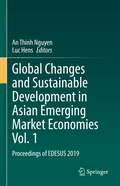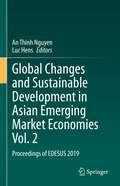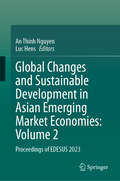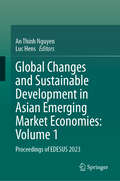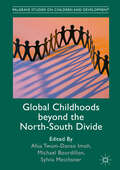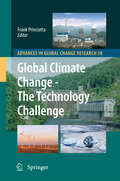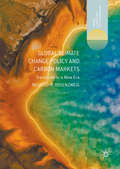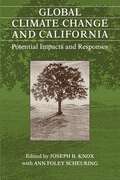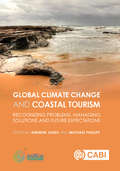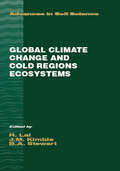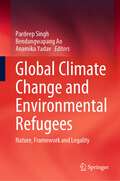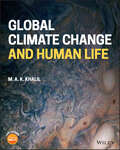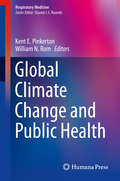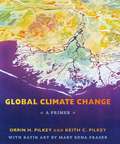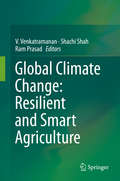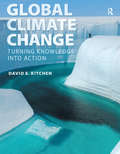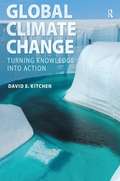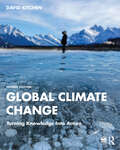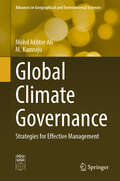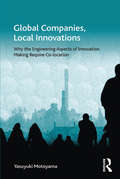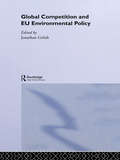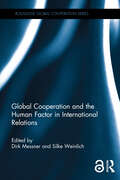- Table View
- List View
Global Changes and Sustainable Development in Asian Emerging Market Economies Vol. 1: Proceedings of EDESUS 2019
by An Thinh Nguyen Luc HensThis two-volume set presents the conference papers from the 1st International Conference on Economics, Development and Sustainability (EDESUS 2019), organized by the University of Economics and Business, Vietnam National University, Hanoi. The collection addresses global changes and sustainable development in Vietnam and other emerging market economies in Asia, and covers wider topics such as economics and business (e.g. economic theory, national and international income distribution, macroeconomic policies, sectors of economy, productivity developments, financial market, business governance, bank financing), development and sustainability (e.g. developing process, development policy, public policy, sustainable growth, sustainability tools, sustainable livelihood, sustainable tourism, green growth), and resources and global change (e.g. human resources, natural resources, climate change, globalization, global challenges). The books are of interest to professors, researchers, lecturers, and students in economics and geography, consultants, and decision makers interested in global changes and sustainable development. Volume 1 focuses on economic development in Vietnam and other emerging market economies in Asia. This covers topics such as economics and business (e.g. economic theory, national and international income distribution, macroeconomic policies, sectors of economy, productivity developments, financial market, business governance, bank financing) and development studies (e.g. developing process, development policy, public policy, green growth).
Global Changes and Sustainable Development in Asian Emerging Market Economies Vol. 2: Proceedings of EDESUS 2019
by An Thinh Nguyen Luc HensThis two-volume set presents the conference papers from the 1st International Conference on Economics, Development and Sustainability (EDESUS 2019), organized by the University of Economics and Business, Vietnam National University, Hanoi. The collection addresses global changes and sustainable development in Vietnam and other emerging market economies in Asia, and covers wider topics such as economics and business (e.g. economic theory, national and international income distribution, macroeconomic policies, sectors of economy, productivity developments, financial market, business governance, bank financing), development and sustainability (e.g. developing process, development policy, public policy, sustainable growth, sustainability tools, sustainable livelihood, sustainable tourism, green growth), and resources and global change (e.g. human resources, natural resources, climate change, globalization, global challenges). The books are of interest to professors, researchers, lecturers, and students in economics and geography, consultants, and decision makers interested in global changes and sustainable development. Volume 2 focuses on global changes and sustainable development in Vietnam and other emerging market economies in Asia. This covers topics such as sustainability (e.g. sustainable growth, sustainability tools, sustainable livelihood, sustainable tourism), and change in resources globally (e.g. human resources, natural resources, climate change, globalization, global challenges).
Global Changes and Sustainable Development in Asian Emerging Market Economies: Proceedings of EDESUS 2023
by An Thinh Nguyen Luc HensThis two-volume set presents the conference papers from the 2023 iteration of the International Conference on Economics, Development and Sustainability (EDESUS 2023), organized by the VNU University of Economics and Business, Vietnam National University, Hanoi. The collection addresses global changes and sustainable development in Vietnam and other emerging market economies in Asia, and covers wider topics such as economics and business (e.g. economic theory, national and international income distribution, macroeconomic policies, sectors of economy, productivity developments, financial market, business governance, bank financing), development and sustainability (e.g. developing process, development policy, public policy, sustainable growth, sustainability tools, sustainable livelihood, sustainable tourism, green growth), and resources and global change (e.g. human resources, natural resources, climate change, globalization, global challenges). The books are of interest to professors, researchers, lecturers, and students in economics and geography, consultants, and decision makers interested in global changes and sustainable development. Volume 2 focuses on global changes and sustainable development in Vietnam and other emerging market economies in Asia. This covers topics such as sustainability (e.g. sustainable growth, sustainability tools, sustainable livelihood, sustainable tourism), and change in resources globally (e.g. human resources, natural resources, climate change, globalization, global challenges).
Global Changes and Sustainable Development in Asian Emerging Market Economies: Proceedings of EDESUS 2023
by An Thinh Nguyen Luc HensThis two-volume set presents the conference papers from the 2023 iteration of the International Conference on Economics, Development and Sustainability (EDESUS 2023), organized by the VNU University of Economics and Business, Vietnam National University, Hanoi. The collection addresses global changes and sustainable development in Vietnam and other emerging market economies in Asia, and covers wider topics such as economics and business (e.g. economic theory, national and international income distribution, macroeconomic policies, sectors of economy, productivity developments, financial market, business governance, bank financing), development and sustainability (e.g. developing process, development policy, public policy, sustainable growth, sustainability tools, sustainable livelihood, sustainable tourism, green growth), and resources and global change (e.g. human resources, natural resources, climate change, globalization, global challenges). The books are of interest to professors, researchers, lecturers, and students in economics and geography, consultants, and decision makers interested in global changes and sustainable development. Volume 1 focuses on economic development in Vietnam and other emerging market economies in Asia. This covers topics such as economics and business (e.g. economic theory, national and international income distribution, macroeconomic policies, sectors of economy, productivity developments, financial market, business governance, bank financing) and development studies (e.g. developing process, development policy, public policy, green growth).
Global Childhoods beyond the North-South Divide (Palgrave Studies On Children And Development Ser.)
by Michael Bourdillon Afua Twum-Danso Imoh Sylvia MeichsnerThis book explores children’s lives across the Global North and Global South in the context of academic discussions of childhoods. The edited volume offers a unique selection of materials suitable for teaching in the areas of children, childhoods, young people, families, and education in a global context, as well as specific aspects of international development and social policy. While the focus of the project is conceptual rather than practical, the holistic understanding of childhoods that it encourages should also enable practitioners to better ensure that they are improving the lives of the children.
Global Climate Change - The Technology Challenge
by Frank PrinciottaIn order to avoid the potentially catastrophic impacts of global warming, the current 3% CO2 global emission growth rate must be transformed to a 1 to 3% declining rate, as soon as possible. This will require a rapid and radical transformation of the world's energy production and end use systems. The current generation of energy technologies are not capable of achieving the level of mitigation required. Next generations of renewable, low carbon generation and end use technologies will be needed. This book quantifies the mitigation challenge. It then considers the status of key technologies needed to protect the planet from serious climate change impact. Current and emerging technologies are characterized for their mitigation potential, status of development and potential environmental impacts. Power generation, mobile sources, industrial and building sectors are evaluated in detail. The importance and unique challenges for rapidly developing countries, such as China and India are discussed. Current global research and development efforts for key technologies are discussed. It is concluded that it will be necessary to substantially upgrade and accelerate the current worldwide RDD&D effort on both emerging energy technologies and those enabling technologies needed to improve mitigation effectiveness and economics. It will also be necessary to carefully evaluate the potential environmental characteristics of next generation technologies to avoid unacceptable health and ecological impacts. Finally, given the monumental technological challenge associated with transforming the world's energy system, geoengineering options are evaluated, since if successfully deployed, they have the potential to allow more time for the necessary energy system transformation. 'This book on Climate Change not only gives a clear picture of the problem but suggests many of the pitfalls in solving it and recommends strongly, a research program to fill the gaps in our knowledge. It is a most useful reference book for all aspects of the problem.' William D. Ruckelshaus, Madrona Venture Group/Evergreen Venture
Global Climate Change Policy and Carbon Markets
by Richard H. RosenzweigIn this book, Richard Rosenzweig, describes the policies proposed and adopted in the first generation of climate change policy-making including the Kyoto Protocol and the carbon markets and assesses their failure to halt the increases of rising emissions of greenhouse gases. Carefully structured throughout, each chapter demonstrate how the first generation of policies failed because they were top down, overly ambitious and complex. The author uses the lessons drawn from this analysis to recommend more modest, targeted policies, arguing that they will be more successful in fighting climate change in the new era of policy-making. An invaluable reference for advanced undergraduate and graduate students in taking relevant courses in Environmental Policy, Law and Business. This book will also be a useful overview for researchers working in the field as well as those working in government and policy.
Global Climate Change and California: Potential Impacts and Responses
by Ann Foley Scheuring Joseph B. KnoxCalifornia's extraordinary ecological and economic diversity has brought it prosperity, pollution, and overpopulation. These factors and the state's national and international ties make California an essential test case for the impact of global climate change—temperature increases, water shortages, more ultraviolet radiation. The scientists in this forward-looking volume give their best estimates of what the future holds.Beginning with an overview by Joseph Knox, the book discusses the greenhouse effect, the latest climate modeling capabilities, the implications of climate change for water resources, agriculture, biological ecosystems, human behavior, and energy.The warning inherent in a scenario of unchecked population growth and energy use in California applies to residents of the entire planet. The sobering conclusions related here include recommendations for research that will help us all prepare for potential climate change.
Global Climate Change and Coastal Tourism
by Michael Phillips Andrew JonesClimate Change and Coastal Tourism includes case studies on climate change and coastal tourism that explore current threats to and consequences of climate change on existing tourism coastal destinations. It assesses management and policy options for the future sustainability of threatened tourism coastal destinations. The cases discussed are from all regions of the world: Europe, The Americas, Asia, Africa, and Australasia. The book synthesize findings to make recommendations that can be used to promote strategies that ameliorate projected impacts of climate change on coastal tourism infrastructure and in turn promote the future sustainability of coastal tourism destinations.
Global Climate Change and Cold Regions Ecosystems
by B. A. Stewart R. Lal J. M. KimbleGlobal Climate Change and Cold Regions Ecosystems provides information on soil processes and the carbon cycle in cold ecoregions as well as the soil carbon pool and its fluxes in the soils of cold ecoregions. Filling a void in this area of soil science, this resource explains soil processes influencing C dynamics under natural and disturbed ecosyst
Global Climate Change and Environmental Refugees: Nature, Framework and Legality
by Pardeep Singh Anamika Yadav Bendangwapang AoThis book explores the possibilities of understanding the concept of climate refugees in order to ascribe to a consensual agreement that climate refugees are evident and this situation is a reality.A framework to study both empirically and theoretically is presented in a detailed manner so that it may become a resource for understanding the challenges of climate refugees.Through discussion and analysis the book presents potential answers to such questions as:● Why has the international system been so short-sighted and has not given importance to the problems of climate migrants and refugees?● How to identify a climate refugee?● How do you justify a climate refugee or a migrant?● What are internally displaced people? Should we call them just refugees?The book covers the interdisciplinary nature of climate refugees and the perspectives of social science. The empirical findings provides an edge to holistically understanding climate refugees.This book discusses the concept of, what really is a climate refugee, and the necessary factors to make it an important part of the climate discourse. The legality of the term is missing in international parlance, and the academic discourse should provide the necessary critique required for the evolution of the subject under study. Therefore, the major objective of the book is to make the subject of climate migration known to all.
Global Climate Change and Human Life
by M. A. KhalilIn our time, the global population has become large enough to cause perceptible environmental changes all over the world. With it, a new science of global change has emerged, mostly as a practical matter to understand and manage the earth’s habitability and create a sustainable environment for some time to come – one which balances the benefits of technological and societal advances with their potential, less desirable side effects. These concerns began with the depletion of the ozone layer and its possible adverse consequences on human health, and have, in recent decades, shifted to climate change driven by ongoing global warming. Why are these global changes occurring? How will they affect our lives? If we find the effects undesirable, what should we do? This book will attempt to answer these questions. It will show how to accomplish the goal of managing our climate, what it will take, and when it needs to be done. Such a management process has to be dynamic, making it more complex and less didactic, requiring changes in strategy to achieve a longer-term goal as our knowledge advances. Global Climate Change and Human Life is a comprehensive and cohesive look at the emerging field of global change science. Using models that take the theoretical or conceptual understanding and translate them into mathematical forms, the book lays out a holistic view of the science that develops and teaches the main principles, concepts and conclusions. In the end, readers will be empowered to use science and the scientific method to decide how important and timely climate change is as a social issue and which solutions can succeed.
Global Climate Change and Public Health
by William N. Rom Kent E. PinkertonPulmonary physicians and scientists currently have minimal capacity to respond to climate change and its impacts on health. The extent to which climate change influences the prevalence and incidence of respiratory morbidity remains largely undefined. However, evidence is increasing that climate change does drive respiratory disease onset and exacerbation as a result of increased ambient and indoor air pollution, desertification, heat stress, wildfires, and the geographic and temporal spread of pollens, molds and infectious agents. Preliminary research has revealed climate change to have potentially direct and indirect adverse impacts on respiratory health. Published studies have linked climate change to increases in respiratory disease, including the following: changing pollen releases impacting asthma and allergic rhinitis, heat waves causing critical care-related diseases, climate driven air pollution increases, exacerbating asthma and COPD, desertification increasing particulate matter (PM) exposures, and climate related changes in food and water security impacting infectious respiratory disease through malnutrition (pneumonia, upper respiratory infections). High level ozone and ozone exposure has been linked to idiopathic pulmonary fibrosis, lung cancer, and acute lower respiratory infection. Global Climate Change and Public Health is an important new volume based on the research, findings, and discussions of US and international experts on respiratory health and climate change. This volume addresses issues of major importance to respiratory health and fills a major gap in the current literature. The ATS Climate Change and Respiratory Health Workshop was held in New Orleans, Louisiana, on May 15, 2010. The purpose of the meeting was to address the threat to global respiratory health posed by climate change. The workshop was attended by domestic and international experts as well as representatives of international respiratory societies and key US federal agencies. Dr. Pinkerton and Dr. Rom, the editors of this title, were co-chairs of the Climate Change Workshop and Symposium.
Global Climate Change: A Primer
by Orrin H. Pilkey Keith C. PilkeyAn internationally recognized expert on the geology of barrier islands, Orrin H. Pilkey is one of the rare academics who engages in public advocacy about science-related issues. He has written dozens of books and articles explaining coastal processes to lay readers, and he is a frequent and outspoken interviewee in the mainstream media. Here, the colorful scientist takes on climate change deniers in an outstanding and much-needed primer on the science of global change and its effects. After explaining the greenhouse effect, Pilkey, writing with son Keith, turns to the damage it is causing: sea level rise, ocean acidification, glacier and sea ice melting, changing habitats, desertification, and the threats to animals, humans, coral reefs, marshes, and mangroves. These explanations are accompanied by Mary Edna Fraser's stunning batiks depicting the large-scale arenas in which climate change plays out. The Pilkeys directly confront and rebut arguments typically advanced by global change deniers. Particularly valuable are their discussions of "Climategate," a manufactured scandal that undermined respect for the scientific community, and the denial campaigns by the fossil fuel industry, which they compare to the tactics used by the tobacco companies a generation ago to obfuscate findings on the harm caused by cigarettes.
Global Climate Change: Resilient and Smart Agriculture
by Ram Prasad Shachi Shah V. VenkatramananThis book provides essential insights into methods and practices of ‘Climate-smart Agriculture,’ which is driven by the principles of climate resilience and smart resource use in agricultural production. Climate-smart agriculture is a key policy instrument for achieving poverty eradication and a hunger-free world, as well as mitigating the effects of climate change. This book discusses in detail climate-smart agricultural technologies and practices that can reduce the vulnerability of agricultural systems, improve the livelihoods of farmers and other stakeholders, and reduce the greenhouse gas emissions from crop production and livestock husbandry. The agriculture, forestry and other land use (AFOLU) sector produces roughly 10–12 gigatons of CO2-equivalent per year; therefore, sustainable practices for agriculture and related land use hold immense potential to mitigate climate change. The potential impacts of climate variability and climate change on agriculture are extensively documented and articulated, especially with regard to global and national environmental agendas that call for innovation, transformation and climate-resilient advances in agriculture. As the book demonstrates, climate-smart agriculture offers an excellent tool for boosting agricultural output to feed the growing global population; for reducing greenhouse gases emissions from agriculture and other land use; and for protecting agricultural production systems from the impending dangers of climate change.
Global Climate Change: Turning Knowledge Into Action
by David E. KitchenThe science of climate change is a complex subject that balances the physical record and scientific fact with politics, policy, and ethics - and is of particular importance to the geosciences. This thoughtfully crafted new text and accompanying media encourage non-science majors to practice critical thinking, analysis, and discourse about climate change themes. Taking a cross-disciplinary approach, acclaimed educator and researcher, David Kitchen, examines not only the physical science, but the social, economic, political, energy, and environmental issues surrounding climate change. His goal: to turn knowledge into action, equipping students with the knowledge and critical skills to make informed decisions, separate facts from fiction, and participate in the public debate.
Global Climate Change: Turning Knowledge Into Action
by David KitchenThis book examines what scientists know about global warming and climate change and considers political and economic solutions that will balance the competing needs of people around the world.
Global Climate Change: Turning Knowledge Into Action
by David KitchenEarth’s climate is changing. This book investigates the scientific, environmental, social, political, and economic aspects of climate change. It enables students to reach an informed opinion and encourages active engagement in finding solutions. It begins with a strong introduction to the scientific factors that drive natural and anthropogenic climate change and expands over three chapters to explore the impact of greenhouse gases on the distribution of solar energy across land, sea, ice, and air. The author examines geologically ancient climates in order to highlight possible future scenarios, and case studies from around the world highlight the impact of climate change on the physical and human environment. The final chapters investigate how society can respond to the challenges of climate change and overcome the political, social, and economic factors that are barriers to progress, focusing on the role of energy policy, fiscal policy, and risk assessment as a means to stimulate discussion about science, society, and the role of the media. Science is the foundation of any solution, but to turn this knowledge into action requires the application of a broad set of skills that are rooted in the liberal arts experience such as critical thinking, analytical thinking, problem solving, and communication. This textbook will be an essential resource for students taking courses in environmental geography, climate change, natural hazards, climatology, and meteorology.
Global Climate Change: Turning Knowledge Into Action
by David KitchenProvides a holistic introduction to climate change: examines of the physical evidence of climate change and impacts, whilst explaining the political, economic and social issues that stand in the way of action. Accessible to non-science majors, whilst also useful to science majors who are new to the topic Presents the issues from the many stakeholders and special interest groups in a balanced way – leaving it to the reader to make their own decisions. Case studies from across the globe bring home the actual socio-economic impact of climate change. Links current crisis to global energy and production and consumption. Evidence for climate change from around the globe is examined, with a focus on physical basis of Earth systems and global warming to differentiate between natural and anthropogenic causes. Ancient climates are explored to help provide context for modern climates, along with a deeper exploration of the climate record from the past 150 years, bridging discussions of social and economic impacts of climate change. Key changes for the new edition: Text updated throughout to reflect updated data and to make note of recent advances in climate science and climate policy in the USA and around the world, including the Paris Agreement, the Green New Deal, stakeholder upheavals, updates in economic models, carbon trading, emissions standards, progress in the developing world, new IPCC reports and communication. Web content updated with links to more recent reports, sites and videos.
Global Climate Governance Beyond 2012
by Frank Biermann Fariborz Zelli Philipp PattbergAn assessment of policy options for future global climate governance, written by a team of leading experts from the European Union and developing countries. Global climate governance is at a crossroads. The 1997 Kyoto Protocol was merely a first step, and its core commitments expire in 2012. This book addresses three questions which will be central to any new climate agreement. What is the most effective overall legal and institutional architecture for successful and equitable climate politics? What role should non-state actors play, including multinational corporations, non-governmental organizations, public-private partnerships and market mechanisms in general? How can we deal with the growing challenge of adapting our existing institutions to a substantially warmer world? This important resource offers policy practitioners in-depth qualitative and quantitative assessments of the costs and benefits of various policy options, and also offers academics from wide-ranging disciplines insight into innovative interdisciplinary approaches towards international climate negotiations.
Global Climate Governance: Strategies for Effective Management (Advances in Geographical and Environmental Sciences)
by Mohd Akhter Ali M. KamrajuThis book serves as a comprehensive and insightful guide to the strategies and mechanisms that underpin effective climate governance on a global scale. From the Paris Agreement to the ongoing efforts within the United Nations Framework Convention on Climate Change (UNFCCC), this book offers an in-depth examination of the international and national initiatives that have emerged to address the intricate and multifaceted problem of climate change. It also provides an exploration of the scientific, political, and economic forces shaping the global climate landscape, casting a discerning light on the evolving dimensions of climate governance. The key features of the book are: 1) Understanding the Science: The book lays the foundation for a comprehensive understanding of the scientific principles underpinning climate change. 2) Political Dynamics: It delves into the intricacies of international climate negotiations, the roles played by major stakeholders, and the historical development of seminal climate agreements. 3) National Policies: The book goes beyond the international arena to investigate the diverse approaches and strategies adopted by nations worldwide. It explores their efforts to mitigate emissions, adapt to changing climate conditions, and promote sustainability at the national level. 4) Case Studies: Real-world case studies drawn from various regions and industries illuminate the successes and challenges of climate governance. These case studies offer valuable lessons for readers seeking practical insights into climate change solutions. 5) Innovations and Solutions: The book showcases the innovative technologies and strategies being developed to combat climate change. 6) Balanced Perspective: The book embraces a balanced perspective that confronts the complexities of climate governance, while also offering a beacon of hope by presenting actionable solutions for a sustainable, resilient future.
Global Companies, Local Innovations: Why the Engineering Aspects of Innovation Making Require Co-location (Economic Geography Series)
by Yasuyuki MotoyamaInvestigating the innovation activities of multinational corporations, this book uncovers and examines why the geography of innovation by multinationals is overwhelmingly local, in spite of their global operations in manufacturing and sales through case studies of produce development by three global players: Toyota, Sony, and Canon. The microdynamic approach of the book allows an in-depth investigation of the engineering and technical aspects of innovation making. The book unfolds the complex and constant process of trial and error in innovation and reveals three fundamental natures of innovation making: complexity, interdisciplinarity, and prototyping and testing. In order to manage these three natures of innovation, firms have to plan, ironically, for unplanned situations and to collocate knowledge, people, and resources.
Global Competition and EU Environmental Policy (Routledge/eui Studies In Environmental Policy Ser.)
by Jonathan GolubGlobal Competition and EU Environmental Policy is the first book to examine the relationship between economic competitiveness and environmental protection in European Union policy.A wide range of international case studies addresses key agreements and policies, including those dealing with ozone layer protection, pesticide exports, shipping climate
Global Cooperation and the Human Factor in International Relations (Routledge Global Cooperation Series)
by Silke Weinlich Dirk MessnerThis book aims to pave the way for a new interdisciplinary approach to global cooperation research. It does so by bringing in disciplines whose insights about human behaviour might provide a crucial yet hitherto neglected foundation for understanding how and under which conditions global cooperation can succeed. As the first profoundly interdisciplinary book dealing with global cooperation, it provides the state of the art on human cooperation in selected disciplines (evolutionary anthropology and biology, decision-sciences, social psychology, complex system sciences), written by leading experts. The book argues that scholars in the field of global governance should know and could learn from what other disciplines tell us about the capabilities and limits of humans to cooperate. This new knowledge will generate food for thought and cause creative disturbances, allowing us a different interpretation of the obstacles to cooperation observed in world politics today. It also offers first accounts of interdisciplinary global cooperation research, for instance by exploring the possibilities and consequences of global we-identities, by describing the basic cooperation mechanism that are valid across disciplines, or by bringing an evolutionary perspective to diplomacy. This book will be of great interest to scholars and postgraduates in International Relations, Global Governance and International Development.
Global Cooperation and the Human Factor in International Relations (Routledge Global Cooperation Series)
by Dirk Messner and Silke WeinlichThis book aims to pave the way for a new interdisciplinary approach to global cooperation research. It does so by bringing in disciplines whose insights about human behaviour might provide a crucial yet hitherto neglected foundation for understanding how and under which conditions global cooperation can succeed.As the first profoundly interdisciplinary book dealing with global cooperation, it provides the state of the art on human cooperation in selected disciplines (evolutionary anthropology and biology, decision-sciences, social psychology, complex system sciences), written by leading experts. The book argues that scholars in the field of global governance should know and could learn from what other disciplines tell us about the capabilities and limits of humans to cooperate. This new knowledge will generate food for thought and cause creative disturbances, allowing us a different interpretation of the obstacles to cooperation observed in world politics today. It also offers first accounts of interdisciplinary global cooperation research, for instance by exploring the possibilities and consequences of global we-identities, by describing the basic cooperation mechanism that are valid across disciplines, or by bringing an evolutionary perspective to diplomacy.This book will be of great interest to scholars and postgraduates in International Relations, Global Governance and International Development.
